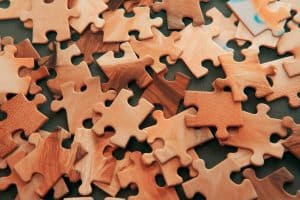Jigsaw puzzles have been a popular pastime for people of all ages for many years. They have the ability to captivate our attention, spark our curiosity, and provide a sense of accomplishment when completed. But have you ever wondered why we love jigsaw puzzles so much? What makes them so addictive and satisfying? In this article, we will explore the science of jigsaw puzzles and why they hold such a special place in our hearts.
The Science of Jigsaw Puzzles
Jigsaw puzzles engage our cognitive skills and abilities in a unique and stimulating way. Solving a jigsaw puzzle requires us to employ visuospatial cognitive tests, which involve mentally manipulating and rearranging puzzle pieces to form a complete picture. This cognitive task analysis allows us to exercise our brain’s visuospatial cognition, or the ability to perceive, analyze, and manipulate visual information.

Numerous studies have highlighted the cognitive benefits of jigsaw puzzle play. One study conducted by researchers in clinical and biological psychology found that solving jigsaw puzzles can enhance broad cognitive abilities and improve cognitive functioning. This is especially important for individuals with mild cognitive impairment, as cognitive stimulation through activities like jigsaw puzzles can help slow down the progression of cognitive decline.
Jigsaw Puzzles and Cognitive Health
Engaging in jigsaw puzzle play has also been linked to improvements in cognitive function and brain health. A study published in the Journal of Aging and Health showed that individuals who regularly completed jigsaw puzzles demonstrated better global visuospatial cognition compared to those who did not engage in such activities. Additionally, computerized cognitive training programs that include jigsaw puzzle interventions have shown promise in improving cognitive skills and abilities.
Furthermore, jigsaw puzzles can be a valuable tool for cognitive health counseling. A systematic review published in The Gerontologist found that jigsaw puzzle interventions can benefit older adults by improving their visuospatial episodic memory, attention, and problem-solving skills. These findings suggest that jigsaw puzzles have the potential to enhance cognitive functioning and promote healthy aging.
Jigsaw Puzzles and Early Cognitive Development
The benefits of jigsaw puzzles extend beyond adults and older adults. Research has shown that jigsaw puzzle play can positively impact cognitive skills in children as well. A study conducted at the University of Florida found that preschoolers who engaged in jigsaw puzzle play exhibited improved spatial transformation skills, which are essential for understanding and manipulating objects in space.

Furthermore, solving jigsaw puzzles can enhance cognitive abilities such as cognitive flexibility, attention to detail, and problem-solving in children. These skills are vital for academic success and overall cognitive development. For a deeper understanding of how puzzles contribute to cognitive development, consider reading this article.
The Mechanics Behind Jigsaw Puzzles
Jigsaw puzzles require more than just cognitive skills. They also demand hand-eye coordination and visual memory span. As we search for the right puzzle pieces and mentally rotate them to fit, we are improving our visuospatial working memory and strengthening our ability to mentally manipulate visual information. To set up an optimal environment for enhancing these skills, explore this guide.
Moreover, jigsaw puzzles have been used as a tool to assess cognitive abilities. They are often included in neuropsychological evaluations, such as the Wechsler Adult Intelligence Scale, to measure aspects of cognitive function. For more information on how puzzles are utilized in assessments, check out this article.
The Role of Experience
Experience plays a significant role in our ability to solve jigsaw puzzles efficiently. Individuals with a lifetime of jigsaw puzzle experience tend to excel in quickly recognizing patterns, shapes, and colors, making the puzzle-solving process more intuitive and enjoyable. This highlights the importance of engaging in jigsaw puzzle play from an early age to develop and sharpen jigsaw puzzle skills. For insights on how puzzle-solving skills improve over time, you might find these tips useful.
Final Thoughts
The science of jigsaw puzzles reveals the numerous cognitive benefits and impacts they have on our brain health and cognitive functioning. Whether you are a seasoned puzzler or just beginning to explore the world of jigsaw puzzles, it is clear that solving these puzzles engages our cognitive skills, enhances our visuospatial cognition, and offers a fun and satisfying way to challenge ourselves. So next time you sit down with a jigsaw puzzle, know that you are not only having fun but also giving your brain a significant workout.

